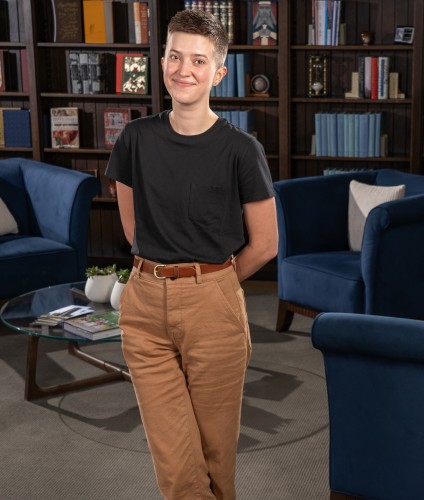
Alyssa Quinn joined the faculty of Kenyon in 2023. They are the author of the novel "Habilis" (Dzanc Books, 2022) and the prose chapbook "Dante's Cartography" (The Cupboard Pamphlet, 2019). Quinn's short work has appeared in Denver Quarterly, The Beloit Fiction Journal, Passages North, Ninth Letter, Mid-American Review, Indiana Review, Copper Nickel, The Rupture, and elsewhere. They are currently at work on a novel about nuclear waste.
Areas of Expertise
Fiction writing; experimental literature; eco-literature
Education
2023 — Doctor of Philosophy from the University of Utah
2018 — Master of Fine Arts from Western Washington University
2016 — Bachelor of Arts from Utah State University
Courses Recently Taught
Each section of these first-year seminars approaches the study of literature through the exploration of a single theme in texts drawn from a variety of literary genres (such as tragedy, comedy, lyric poetry, epic, novel, short story, film and autobiography) and historical periods. Classes are small, offering intensive discussion and close attention to each student's writing. Students in each section are asked to work intensively on composition as part of a rigorous introduction to reading, thinking, speaking and writing about literary texts. During the semester, instructors assign frequent essays and may also require oral presentations, quizzes, examinations and research projects. This course is not open to juniors and seniors without permission of the department chair. Offered every year.
This course introduces students to the elements of fiction writing. While each section of the course varies in approach and structure, activities and assignments may include intensive reading, workshops, writing, short and flash fiction, and exercises emphasizing various aspects of fiction such as place, dialogue and character. Students should check the online schedule for specific descriptions of each section. This counts toward the emphasis in creative writing and the creative practice requirement for the major. Admission to this course is open, though students may not take it in the first semester of their first year. Seats are reserved for students in each class year. Offered every year.
This workshop focuses on discussion of participants' fiction as well as on exercises and playful experimentation. Principally, we are concerned with how stories work at every level. As we consider narrative strategies and practical methods for developing individual styles, along with approaches to revising work, we also read, as writers, a variety of outside texts. This counts toward the creative writing emphasis and toward the creative practice requirement for the major. Prerequisite: ENGL 200, 202 or 204 (or an equivalent introductory workshop) and permission of instructor via application. Consult the department for information on the application process and deadlines.
Students in this workshop undertake an extended creative project in prose (30-40 pages), which counts as their Senior Capstone project for the English major with an emphasis in creative writing. Projects in fiction, nonfiction, science and nature writing, and hybrid narrative forms are welcome. Students have the opportunity to workshop this project over the course of the semester, and study critical and creative readings chosen by the instructor. Prerequisite: ENGL 300 or ENGL 302, , senior English majors only.
Individual study in English is a privilege reserved for senior majors who want to pursue a course of reading or complete a writing project on a topic not regularly offered in the curriculum. Because individual study is one option in a rich and varied English curriculum, it is intended to supplement, not take the place of, coursework, and it cannot normally be used to fulfill requirements for the major. An IS earns the student 0.5 units of credit, although in special cases it may be designed to earn 0.25 units. To qualify to enroll in an individual study, a student must identify a member of the English department willing to direct the project. In consultation with that faculty member, the student must write a one- to two-page proposal that the department chair must approve before the IS can go forward. The chair’s approval is required to ensure that no single faculty member becomes overburdened by directing too many IS courses. In the proposal, the student should provide a preliminary bibliography (and/or set of specific problems, goals and tasks) for the course, outline a specific schedule of reading and/or writing assignments, and describe in some detail the methods of assessment (e.g., a short story to be submitted for evaluation biweekly; a 30-page research paper submitted at course’s end, with rough drafts due at given intervals). Students should also briefly describe any prior coursework that particularly qualifies them for their proposed individual studies. The department expects IS students to meet regularly with their instructors for at least one hour per week, or the equivalent, at the discretion of the instructor. The amount of work submitted for a grade in an IS should approximate at least that required, on average, in 400-level English courses. In the case of group individual studies, a single proposal may be submitted, assuming that all group members follow the same protocols. Because students must enroll for individual studies by the seventh class day of each semester, they should begin discussion of their proposed individual study well in advance, preferably the semester before, so that there is time to devise the proposal and seek departmental approval.